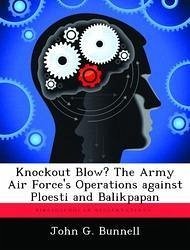This study analyzes the us army air force's Ploesti and Balikpapan oil refinery bombing operations in WWII. The author determines that these operations highlight organizational and leadership differences that have implications for today. The writer first recounts the 1943 low-level raid against ploesti. The conclusion is that the strategic and tactical concepts for this first raid were flawed, leading to heavy losses without any appreciable benefit. The author then describes the us strategic air force's sustained operations against Ploesti during 1944. This examination shows that the Americans linked these attacks with a more realistic strategy and thus contributed significantly to allied war aims. However, slow tactical change characterized the 1944 operations, leading to heavy cumulative losses in the pursuit of strategic effects. The author next turns to the surprisingly parallel balikpapan operation in the pacific. The writer initially recounts the first two large-scale bombing operations during September and October 1944. The conclusion is that these initial operations, like the first Ploesti attack, contained major strategic and tactical flaws.
Hinweis: Dieser Artikel kann nur an eine deutsche Lieferadresse ausgeliefert werden.
Hinweis: Dieser Artikel kann nur an eine deutsche Lieferadresse ausgeliefert werden.








